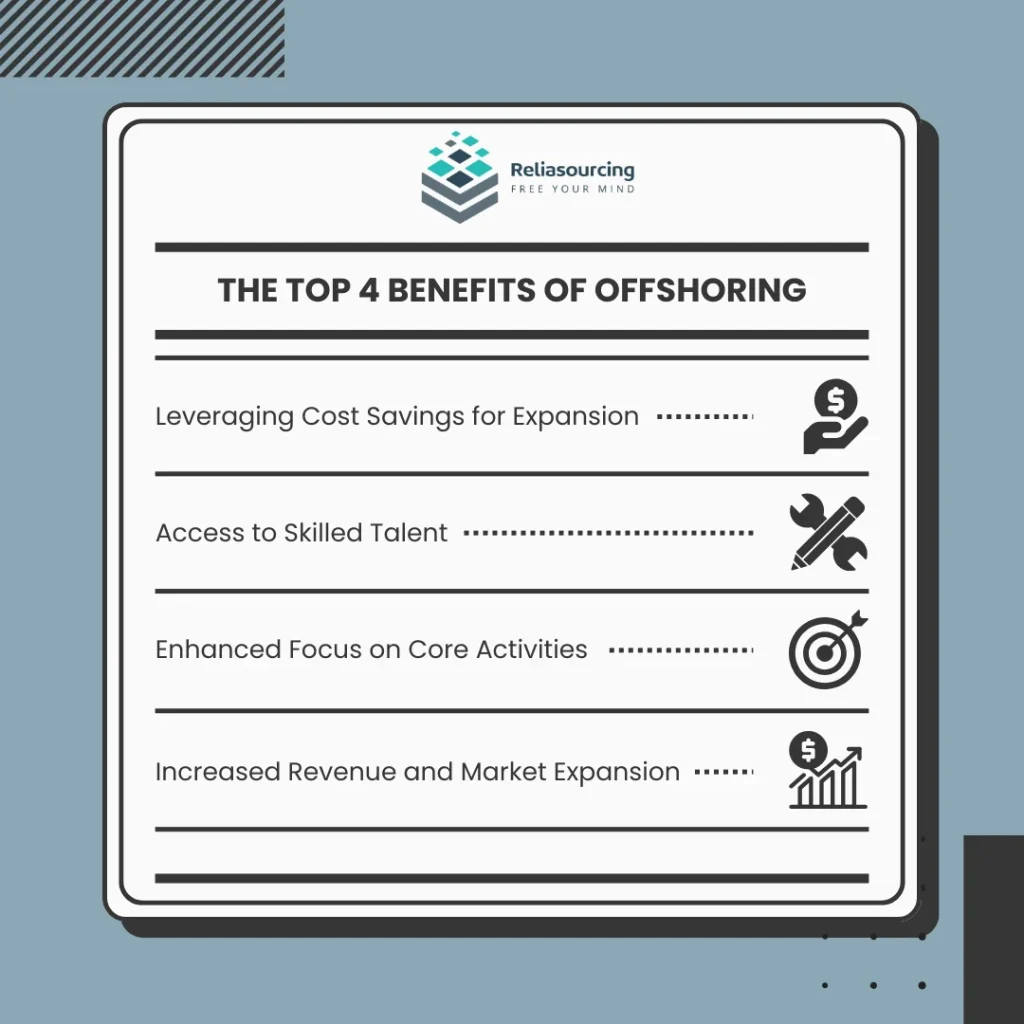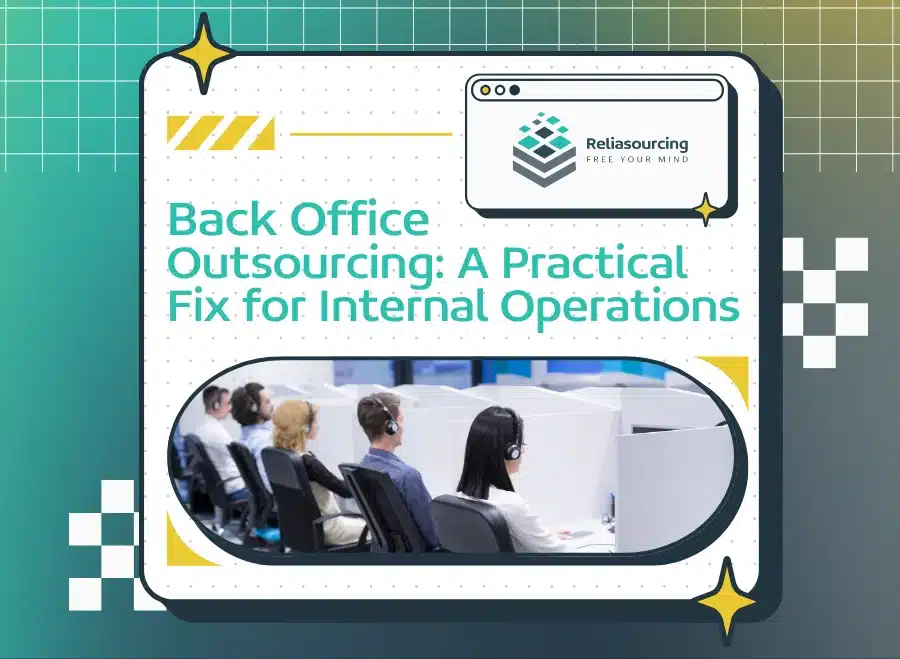As we navigate the dynamic landscape of 2026, businesses are constantly seeking innovative strategies to stay competitive and maximize efficiency. Offshoring can give companies benefits and a significant competitive advantage, whether accessing specialized skills or lowering operational costs.
This trend is driven by the growing need for businesses to stay competitive in a rapidly evolving marketplace. Offshoring allows organizations to streamline operations, focus on core competencies, and achieve significant savings on labor and operational costs. Furthermore, advancements in communication technology and project management tools have made it easier than ever to manage offshore teams effectively.
As a result, more businesses are recognizing offshoring as a vital component of their growth strategy, ensuring they remain agile and responsive to market demands.
What is offshoring?
Offshoring is a strategic business practice where companies relocate specific operations or processes to another country. This approach aims to capitalize on cost efficiencies, access skilled talent pools, and gain strategic advantages that bolster a company’s competitiveness in the global market.
The concept of offshoring emerged in the late 20th century as technological advancements and globalization began reshaping the business landscape. Initially, businesses sought cost savings by moving manufacturing processes to countries with lower labor costs. This shift gradually evolved beyond manufacturing to include services such as customer support, IT development, and back-office operations. In the early 2000s, offshoring became integral to many multinational corporations’ strategies, driven by the quest for operational efficiency and access to specialized skills in emerging markets.
In 2026, offshoring continues to play a pivotal role in business strategies worldwide. Research indicates that a significant number of companies across various industries are actively leveraging offshoring to optimize operations and stay competitive. The approach not only facilitates cost savings but also enables firms to scale rapidly, access diverse talent pools, and innovate more effectively.
With advancements in digital communication and project management tools, managing offshore teams has become increasingly efficient, further fueling the adoption of offshoring as a cornerstone of modern business growth strategies.
Examples of offshoring
Offshoring involves relocating business functions to other countries to leverage cost efficiencies and access specialized skills. This strategic practice is commonly adopted across various industries to optimize operations and remain competitive in global markets.
Examples of functions outsourced in offshoring
Customer Service: Many companies offshore their customer service operations to countries like India and the Philippines. These locations offer large, English-speaking workforces at a lower cost, providing efficient and effective customer support.
Manufacturing: Manufacturing is frequently offshored to countries with lower labor costs, such as China and Vietnam. This helps companies reduce production expenses and increase profitability while maintaining quality standards.
IT Services: IT services, including software development, technical support, and data management, are often offshored to tech hubs like India. These regions provide a highly skilled, cost-effective workforce, making it an attractive option for businesses looking to enhance their technological capabilities.
Human Resources (HR): Functions such as payroll processing, recruitment, and employee training are commonly offshored to benefit from the expertise and efficiency of specialized HR service providers in countries like the Philippines and India.
Accounting and Finance: Many businesses offshore accounting and financial services to countries with a strong background in finance and economics, such as India. This includes tasks like bookkeeping, tax preparation, and financial analysis.
The pros and cons of offshoring
Offshoring has become a strategic choice for many companies seeking to enhance their operations and increase profitability. This approach involves relocating certain business functions to countries with favorable economic conditions. Let’s explore the pros and cons of offshoring and how it can be advantageous for businesses.
Pros
Offshoring offers substantial cost savings, as labor and operational costs in offshore locations are typically much lower than in the company’s home country. This reduction in expenses allows businesses to allocate resources more efficiently, potentially increasing their profitability. Additionally, offshoring grants companies access to a vast pool of skilled talent.
Many offshore destinations are home to professionals with expertise in various fields, from IT and customer service to manufacturing and finance. This access enables companies to leverage specialized skills without incurring the higher costs associated with domestic talent.
Furthermore, by offshoring non-core activities, businesses can focus more on their core competencies and strategic goals. This focus can lead to improved efficiency, innovation, and overall performance, helping companies to grow and succeed in competitive markets.
Cons
However, offshoring is not purely benefits, it has its own set of challenges. One of the primary drawbacks is the potential for communication barriers. Differences in time zones, languages, and cultural norms can complicate communication between the company and its offshore team, potentially leading to misunderstandings and delays.
Additionally, maintaining quality control can be more difficult when operations are managed from a distance. Ensuring that offshore processes meet the company’s standards requires robust management and oversight mechanisms, which can be complex and resource-intensive. Despite these challenges, with careful planning and execution, the benefits of offshoring can significantly outweigh the drawbacks, making it a valuable strategy for many businesses.
The top 4 benefits of offshoring in 2026

In 2026, businesses are increasingly adopting offshoring as a strategic approach to remain competitive and maximize profitability. Offshoring, the practice of relocating business operations to another country, offers numerous advantages that can drive growth and increase income. This section explores how companies can leverage offshoring to expand their operations and boost their bottom line, supported by actual data from successful offshored companies.
1. Leveraging Cost Savings for Expansion
One of the primary benefits of offshoring is significant cost savings. In this sense, relocating operations to countries with lower labor and operational costs, companies can reduce expenses and allocate those savings towards expansion initiatives. For example, offshoring customer service operations to countries like India or the Philippines, where labor costs are lower, can free up financial resources. These savings can be reinvested into research and development, marketing, or opening new branches, thus driving growth and increasing market presence.
2. Access to Skilled Talent
Offshoring also provides access to a large pool of skilled professionals. Countries like India, China, and the Philippines have a robust workforce with expertise in various fields such as IT, engineering, and customer service. This access to talent allows companies to tap into specialized skills without the higher costs associated with domestic hiring. For instance, tech giants like IBM and Microsoft have offshored a significant portion of their software development to India, leveraging the country’s skilled IT professionals to enhance their product offerings and maintain competitive advantage.
3. Enhanced Focus on Core Activities
Businesses can focus more on their core competencies and strategic goals by offshoring their non-core activities. This shift enables companies to streamline operations and improve efficiency. For example, General Electric (GE) offshored its back-office operations to India, allowing the company to concentrate on innovation and product development. This strategic focus has helped GE maintain its leadership position in the global market.
4. Increased Revenue and Market Expansion
Offshore outsourcing can significantly enhance revenue by enabling companies to scale their business operations more efficiently. Many businesses have successfully offshored customer support and IT services to countries like the Philippines and India. This approach allows them to handle a larger volume of customer interactions and technical support at reduced costs, which improves service delivery and boosts revenue. Studies show that businesses leveraging offshore BPO operations can achieve substantial cost savings, enhancing their overall flexibility and operational efficiency. In the UK, outsourcing have become to the most notable option in expansion for 70% of B2B decision-makers, in a study by YouGov.
According to various studies, businesses that offshore their BPO operations can save up to 75% in costs while achieving greater flexibility and innovation.
Offshoring Success Stories
Several companies have successfully leveraged offshoring to boost their growth and revenue. For instance, HSBC, one of the world’s largest banking and financial services organizations, offshored its call center operations to the Philippines. This move not only reduced operational costs but also improved customer service quality, contributing to a higher customer satisfaction rate and increased revenue.
Similarly, Procter & Gamble (P&G) offshored its IT services to India, achieving cost efficiencies and access to a highly skilled workforce. This strategic decision has enabled P&G to innovate faster and bring new products to market, resulting in a significant increase in revenue last year.
Offshoring offers numerous benefits that can help companies expand their operations, enhance efficiency, and increase revenue. Real-world examples from companies like IBM, GE, Apple, HSBC, and P&G demonstrate the tangible advantages of offshoring, making it a compelling strategy for businesses aiming to thrive in the global marketplace.
How to choose an offshoring service provider that best fits your company
Selecting the right offshoring service provider is key to maximizing benefits and minimizing risks. Start by defining your business goals and which processes to offshore.
Research providers with a proven track record in your industry, looking for certifications and awards. Evaluate their infrastructure, technology, and security measures. Engage in discussions to assess communication, cultural compatibility, and flexibility. Request references to understand their reliability and performance.
Consider starting with a pilot project to evaluate the provider’s performance before fully committing. Following these steps will help you choose a provider that aligns with your business goals.
Frequently asked questions
Is offshoring different from outsourcing?
Yes, offshoring refers to relocating business processes to another country, whereas outsourcing involves contracting out services to third-party providers, which can be domestic or international.
How much does offshoring cost?
Costs vary widely depending on the country, industry, and specific services. Generally, labor costs in popular offshoring destinations are significantly lower than in Western countries. For instance, companies can save significantly by offshoring staff to the Philippines, where the cost for outsourcing services ranges from $20 to $80 per hour, depending on the type of service and expertise required.
Where are the most common destinations for offshoring?
Popular offshoring destinations include India, the Philippines, China, and Vietnam, known for their skilled labor and cost advantages.
How Reliasourcing helps with offshore outsourcing
Reliasourcing stands out in offshore outsourcing with its comprehensive managed services, particularly in the Philippines. Specializing in contact center services, digital marketing, IT support, and back-office operations, Reliasourcing leverages the Philippines’ skilled workforce to offer high-quality, cost-effective solutions.
One of the key strengths of Reliasourcing’s managed services is the ability to access specialized Filipino talent, renowned for their proficiency in English and strong work ethic. This expertise extends to crucial areas like IT support and cybersecurity, ensuring businesses can rely on top-notch services without the hassle of managing these functions in-house.
Reliasourcing provides 24/7 support, guaranteeing that critical systems are always operational and secure. This round-the-clock service enhances productivity and market competitiveness. The managed services offered by Reliasourcing also promote scalability, enabling businesses to adjust resources as needed, and ensure proactive maintenance and strategic workforce augmentation. This proactive approach extends beyond mere problem-solving, encompassing continuous monitoring and improvements.
Review
Looking into the economic landscape of 2026, offshoring has become an essential strategy for businesses aiming to stay competitive and efficient. Offshoring has been widely adopted across various industries, from customer service and manufacturing to IT and finance. Despite some challenges, such as communication barriers and quality control issues, the benefits of offshoring often outweigh the drawbacks and further drive growth and innovation to businesses worldwide.
Ready to take your business to the next level with offshoring? With access to skilled Filipino talent, Reliasourcing ensures high-quality offshoring solutions that enhance productivity and market competitiveness.
Partner with Reliasourcing today to streamline your operations and achieve your strategic goals. Contact us now to learn more!









